Description

Disclaimer: Copyright infringement not intended.
Context
- West Bengal Government had filed an original suit against the Centre under Article 131 of the Constitution.
Article 131 of the Indian Constitution
- Article 131 grants the Supreme Court exclusive and original jurisdiction in disputes involving law between states or between states and the Union.
- It ensures the protection of fundamental rights, allowing violations to be brought to the High Court of the particular state under Article 226 or to the Supreme Court under Article 32.
Nature and Scope
- The Supreme Court, as the Federal Court of India, upholds the constitutional separation of powers between the center and state governments.
- It has primary jurisdiction over disputes between the Union and states or between states, ensuring legal rights are upheld and disputes resolved effectively.
Dispute Resolution
- Disputes under Article 131 must involve a question of law or fact that affects legal rights, excluding political conflicts.
- The Supreme Court's exclusive jurisdiction ensures disputes are resolved directly, without multiple judicial hierarchies.

Challenging Central Laws
- States can challenge central laws under Article 131 if they believe their legal rights are infringed.
- The Supreme Court's interpretation of such disputes must be acceptable and uphold the Constitution.
Landmark Judgments
- State of West Bengal v. Union of India (1963): First case invoking Article 131, where the Supreme Court upheld the validity of the Acquisition and Development Act, 1957.
- State of Karnataka v. Union of India (1977): Established that the Supreme Court has jurisdiction to consider disputes under Article 131 involving state legislatures.
- State of Madhya Pradesh v. Union of India (2011): Highlighted the role of Article 131 in disputes between states and the center, emphasizing the need for legal rights to be protected.
Conclusion
- Article 131 plays a crucial role in maintaining the federal structure of India, ensuring cooperative federalism between the center and states.
- The Supreme Court's exclusive jurisdiction under Article 131 is essential for upholding legal rights and resolving disputes effectively, contributing to the smooth functioning of Indian democracy.
|
PRACTICE QUESTION
Q. Which of the following statements regarding Article 131 of the Indian Constitution is/are correct?
1.Article 131 grants the Supreme Court exclusive and original jurisdiction in disputes involving law between states or between states and the Union.
2.States can challenge central laws under Article 131 if they believe their legal rights are infringed.
3.Disputes under Article 131 must involve a question of law or fact that affects legal rights including political conflicts.
Select the correct answer using the codes below:
A) 1 and 2 only
B) 1, 2, and 3 only
C) 1 and 3 only
D) 2 and 3 only
Correct Answer:
A) 1 and 2 only
|














